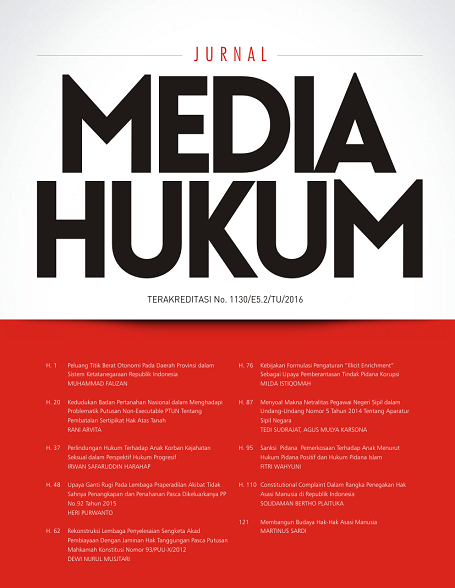The Urgency of Leniency Program Against Cartels in Indonesia: Lesson Learned from Singapore Competition Law
DOI:
https://doi.org/10.18196/jmh.v28i2.11650Keywords:
cartel, competition law, leniency programAbstract
Globalization is characterized by a process where the economy becomes more tightly integrated and manifested in the form of free trade. Free trade forced by economic globalization has brought adverse effects. Some of the harmful effects of free trade include the rise of international cartels, for instance, those involved in price-fixing, bid-rigging, output limitation, and market sharing. This normative legal research aims to examine the application of leniency programs in the enforcement of Competition Law in Singapore and how Indonesia can learn from Singapore. The research indicates that one particular method is commonly used in several countries in the context of law enforcement against cartels, which is known as the leniency program or the Whistleblower. Singapore, as one of the neighboring countries of Indonesia, also applies for the leniency program. As a result, Singapore has successfully resolved many international cartel issues. Consequently, the leniency program gives benefits for providing evidence for related cases. In conclusion, Indonesia should learn from Singapore's experience in implementing the leniency program to prevent the negative effect of free trade, including the proliferating international cartels.
References
Anggraini, T A M. (2003). Larangan Praktek Monopoli dan persaingan Usaha Tidak Sehat Per se illegal atau Rule of Reason. Program Pascasarjana Fakultas Hukum Universitas Indonesia.
Ariyanti, F. (2014). KPPU Selidiki Kartel Bank Singapura Atas Lima Mata Uang, retrieved from https://www.liputan6.com/bisnis/read/2078492/kppu-selidiki-kartel-bank-singapura-atas-lima-mata-uang
Blum, U., Steinat, N. & Veltins, M. (2008). On The Rationale Of Leniency Programs: A Game-Theoretical Analysis. European Journal of Law and Economics, 25 (3), 209-229.
bplawyers.co.id (2017). Kilas Balik 5 Kasus Kartel Terbesar Di Indonesia, retrieved from https://bplawyers.co.id/2017/02/24/kilas-balik-5-kasus-kartel-terbesar-di-indonesia/
CCCS 700/002/11, Violation of Prohibition of Article 34 in connection with the supply of ball and roller bearings.
CCCS 700/003/11, Violation of Prohibition of Article 34 relating to the provision of air freight forwarding services for shipping from Japan to Singapore.
CCCS Guidelines. (2016). CCCS Guidelines on the Section 34 Prohibition 2016.
Chen, J., & Harrington Jr, J. E. (2007). The Impact of The Corporate Leniency Program on Cartel Formation and The Cartel Price Path. The Political Economy of Antitrust Emerald Group Publishing Limited, 282.
Competition and Consumer Commission of Singapore. (2016). Apply for Leniency, retrieved from https://www.cccs.gov.sg/approach-cccs/applying-for-leniency
De León, I. (2009). An Institutional Assessment of Antitrust Policy: The Latin AmericanExperience. Kluwer Law International.
Eversheds Sutherland. (2021). Dawn Raids, retrieved from https://www.eversheds-sutherland.com/global/en/what/practices/anti-trust-competition-eu-trade/dawn-raids.page
Gaspers, V. (1999).Ekonomi Manajerial: Pembuatan Keputusan Bisnis cet.1. Gramedia Pustaka Utama.
Hammond, S D. (2008). Cornerstones of An Effective Cartel Leniency Programme. Competition Law International, 4(2).
Hong, J. (2018). It took sleuths four years to crack biggest price-fixing case, Retrieved from https://www.straitstimes.com/singapore/it-took-sleuths-four-years-to-crack-biggest-price-fixing-case
Irani, F N H A. (2016). Globalization and Challenges; What are the globalization's contemporary issues?. International Journal of Humanities and Social Science, 1(6).
Jaspers, J. D.. (2017). Managing Cartels: how Cartel Participants Create Stability in the Absence of Law, European Journal on Criminal Policy and Research, 23(3).
Kojima, T. (2002). International Conflicts over the Extraterritorial Application of Competition Law in a Borderless Economy. Weatherhead Center for International Affairs.
KPPU. (2009). Kunjungan Kehormatan dan Pertemuan Bilateral antara KPPU dan KFTC.Ed. 16.
KPPU. (2009). Pertemuan Ketua KPPU dan Ketua Komisi Persaingan Rusia di antara Konferensi Persaingan Usaha BRIC. Kompetisi ed. 18.
KPPU. (2011). Program Leniency Dalam Mengungkap Kartel Menurut Hukum Persaingan Usaha. Jurnal Persaingan Usaha, 6.
Lubis, A F. (2013). Analisis Ekonomi dalam Pembuktian Kartel. Jurnal Hukum Bisnis, 32.
Lubis, A. F., Anggraini, A. M. T., Toha, K., Kagramanto, B., Hawin, M., Sirait, N. N., Sukarmi, Maarif, S., & Silalahi, U. (2009). Hukum Persaingan Usaha Antara Teks & Konteks (A. F. Lubis & N. N. Sirait (eds.)). Deutsche Gesellschaft für Technische Zusammenarbeit (GTZ) GmbH.
McEachern, W A. (2009). Economics: A Contemporary Introduction, 8th Edition. USA: South-Eastern Cengage Learning.
Monti, M. (2000). Fighting Cartels Why and How. 3rd Nordic Competition Policy Conference, Stockholm.
Na’aim, M., Rajamanickam, R., Abd Razak, M., Idris, N., & Abdullah, F. (2019). The Use of Leniency Programme in Detecting Cartels in Malaysia. Academic Journal Of Interdisciplinary Studies, 8(2), 226.
Nasution, F., & Wiranti, R. (2008). Kartel dan Problematikanya. Majalah Kompetisi, 11.
oecd.org. (2001). Using Leniency to Fight Hard Core Cartels, retrieved from http://www.oecd.org/corporate/ca/1890449.pdf
Park, S . (2014). The Effect of Leniency Programs on Endogenous Collusion. Economics Letters, 122(2).
Peraturan Komisi Pengawas Persaingan Usaha Nomor 1 Tahun 2019 Tata Cara Penanganan Perkara Praktik Monopoli dan Persaingan Usaha Tidak Sehat.
Philips, L. (1998). Applied Industrial Economics. Cambridge University Press.
Putra, N C. (2017). Salah Kaprah Leniency Program dalam Revisi UU Persaingan Usaha, retrivied from https://m.hukumonline.com/berita/baca/lt598c26df88b34/salah-kaprah-leniency-program-dalam-revisi-uu-persaingan-usaha
Rancangan Undang-undang Larangan Praktik Monopoli dan Persaingan Usaha Tidak Sehat, retrieved from https://www.dpr.go.id/dokakd/dokumen/RJ2-20161111-041211-1939.pdf
Rey, P G., Aubert, C. & Kovacic, W E. (2006). The Impact of Leniency and Whistle-Blowing Programs on Cartels. International Journal of Industrial Organization 24(4), 1241-1266. http://dx.doi.org/10.1016/j.ijindorg.2006.04.002.
Shiau, D., Chen, E., & Clements, S. (2021) The Cartels and Leniency Review: Singapore, retrieved from https://thelawreviews.co.uk/title/the-cartels-and-leniency-review/singapore
Simbolon, A. (2019). Prevention of Monopolistic Practices and Unfair Business Competition Through Business Competition Supervision. Journal of Legal, Ethical and Regulatory, 22(1).
Sirait, N N. (2003). Asosiasi & Persaingan Usaha Tidak Sehat. Pustaka Bangsa Press.
Siswanto, A. (2004). Hukum Persaingan Usaha. Ghalia Indonesia.
Smuda, F. (2012). Cartel Overcharges and the Deterrent Effect of EU Competition Law. Journal of Competition Law & Economics, 10(1).
Sundaja, A. “Report on Leniency Programme: A Key Tool To Detect Cartels” on Rachman, Miftahur. (2007). Leniency Program sebagai Upaya Memberantas Kartel dalam Hukum Persaingan Usaha di Indonesia. Business Law Review, 3.
Sweeney, B. (2009). International Competition Law And Policy: A Work In Progress. Melbourne Journal of International Law, 10(1).
Undang Undang Nomor 5 tahun 1999 Larangan Praktek Monopoli dan persaingan Usaha Tidak Sehat.










